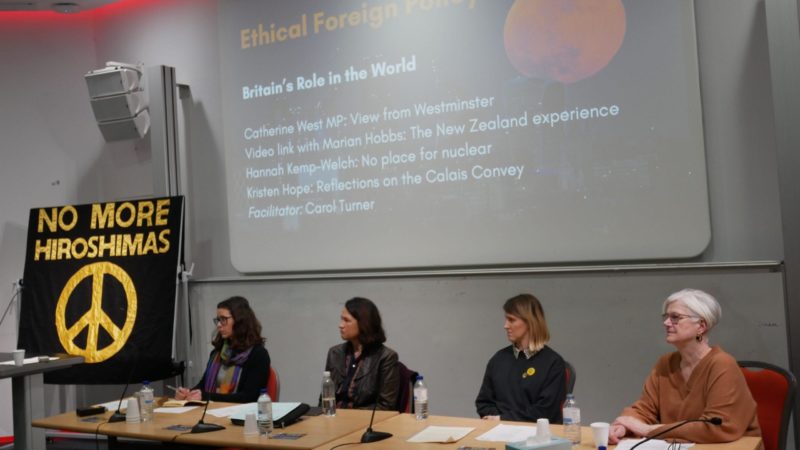Catherine West MP MP for Hornsey & Wood Green and Labour Candidate for Hornsey & Friern Barnet

As one of London CND’s Vice Presidents, I was pleased to take part in their annual conference this weekend and speak about Britain’s place in the world.
Here’s an outline of what I said:
- Good foreign policy is underpinned by three basic pillars of security, trade and human rights. I’ve always believed that the UK’s departure from the European Union will, in geopolitical terms, weaken our role, our influence and our position in the world. It’s one of the many reasons I so strongly opposed it. But even before leaving the European Union, we have seen how this Conservative Government has failed in its role to work multilaterally to lead efforts on nuclear non-proliferation and disarmament.
- That is particularly concerning coming at a time when I fear the world is at an extremely dangerous juncture. President Trump’s reckless withdrawal of the US from the Iran nuclear deal was a senseless act of diplomatic sabotage that raises tensions in the region and makes the world a more dangerous place. Nuclear risk is increasing. The UN has noted that the “threat of the use – intentional or otherwise of nuclear weapons is growing. This threat, which concerns all humanity, will remain for as long as nuclear weapons continue to exist in national arsenals”. According to a growing body of research increased resource scarcity as a result of climate change will make the risk of nuclear war more likely.
- As a nuclear power, we have a responsibility to prevent the use of nuclear weapons, reduce the danger of nuclear war and lead efforts on non-proliferation and disarmament. But under this Conservative Government we’ve seen the UK fail to participate in a string of multilateral discussions on nuclear disarmament, including meetings and conferences mandated by the UN.
- The list is long. Since 2010 UK representatives have been absent at multiple initiatives and discussions on multilateral disarmament, including: 2013 UN Open-Ended Working Group, 2013 conference on the humanitarian impact of nuclear weapons in Oslo, 2014 conference on the humanitarian impact of nuclear weapons in Nayarit, 2016 UN Open-Ended Working Group.
- Perhaps most egregiously though, the UK chose not to participate in the negotiations which created the TPNW, also known as the ‘ban treaty’, adopted at the UN in July 2017 with the support of 122 countries. Throughout the process, rather than participating in good faith to shape the outcome in line with UK interests, the UK dismissed the initiative from the outside, at times literally:in March 2017, the UK ambassador joined his US counterpart in protesting the initiative by standing outside the negotiating room while the Pope and Hiroshima survivors prepared to address delegates on the need for a world free of nuclear weapons.
- We should have signed the treaty and be playing a key role working towards the global elimination of nuclear weapons.
- Our Government’s approach is irreconcilable with the UK’s international obligation under Article 6 of the Nuclear Non-Proliferation Treaty (NPT) which requires the UK to participate in negotiations on disarmament in “good faith”. Non-participation in discussions attended by the vast majority of UN member states is also at odds with the 2010 outcome document of the NPT in which nuclear armed states agreed to “consider the legitimate interest of non-nuclear-weapon-states”.
- We shouldn’t be outside the room.We should be at the heart of discussions. World peace and the UK’s security rely on a series of strong relationships and networks that can assert a dominant position so that aggressive forces can be held in check.
- Belonging to the EU provided a non-military network of friends and allies to rely on in tough times. Modern defence issues are as much about shared databases as traditional notions of bombs and guns. We have to ensure that in abandoning our leadership role in European affairs, we don’t fragment a very strong and assertive voice in defence, such as in discussions on cyber-security, in shared counter-terror tools and in wider questions of weapons proliferation.
- I also want to see the UK thinking much harder on the big question of what is security in this modern world? So many of the discussions, around nuclear and security more generally come from a narrow, often militaristic, definition that is outdated in the modern world. We have to look more holistically. To recognise the importance of the real threats we face – we are more likely to come under attack from opportunistic terrorist threats or cyberwarfare than traditional forms of warfare.
- And crucially to recognise the role of climate security. Climate change is fast becoming a factor in people’s security in the poorest parts of the world. The dangerous mix of drought, famine and Islamic extremism pose a threatening question which we must answer.
- In a world that is becoming increasingly characterised by uncertainty, insecurity and volatility, most notably from the UK’s supposed closest ally America, and where we have stepped away from EU, the most successful peace project in history, the UK must step forward with the values of internationalism, peace, human rights and 21stcentury security at its heart.
